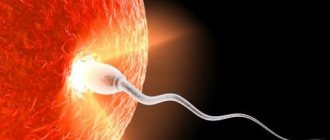Is it possible to get pregnant during menstruation? The answer cannot be unambiguous. Each female body is individual, and deviations from the “normal” ovulation period are possible. Let's take a closer look at the various situations.
Making love during menstruation. For what?
And really - why? This is not a very pleasant thing. And since the question about pregnancy is asked, it means sexual intercourse is planned without using a condom. Is it due to all-consuming passion? Not always... More often - the belief that it is impossible to get pregnant at the beginning of the menstrual cycle. And this statement is very heartwarming for those women who do not use reliable contraception. Firstly, this statement is very doubtful (we will look at why below), and “is it possible to get pregnant during menstruation” is the right question. Secondly, during menstruation, the cervix is slightly open, which means that the entrance to the uterus for various pathogens is open!
What is the probability of pregnancy?
Surely, many of you know that pregnancy can only begin if the sperm meets the egg. And this can only happen during the period of ovulation. Sperm can live in the vagina for up to 7 days, and an egg can live for no more than 2 days. That is, it would be logical to assume that rapid conception even in a healthy couple is not always possible; the likelihood of this increases with the frequency and regularity of sexual intercourse.
Ovulation is the second, short phase of the menstrual cycle and occurs right in the middle. Thus, if the menstrual cycle is classically 28 days (the cycle is counted from the first day of the last menstruation to the first day of the next), then ovulation will occur on day 14 (plus or minus 2 days). In this situation, determining whether “it is possible to get pregnant during menstruation” is quite simple - this is impossible, unless menstruation lasts no more than the prescribed 7 days. But if the menstrual cycle is short - 23-24 days, then dangerous days may occur precisely on the last days of menstruation, that is, on days 5-7. Let ovulation occur on the 11th day, but as we have already said, sperm have the ability to maintain their viability for several days, being already inside the female body. If some nimble sperm waits for ovulation, then conception is quite likely.
However, the answer to the question “is it possible to get pregnant on the first day of your period” can definitely be answered in the negative, even if the menstrual cycle is very short. Conditions for sperm are unfavorable during this period, especially if the discharge is abundant. On the other hand, for the same reason, few people would think of making love during this period. If someone claims that pregnancy occurred on the first day of menstruation, then the matter is different - pregnancy occurred earlier, 2 weeks before the “not real” menstruation, and the woman did not know about it. And in the first weeks of pregnancy, bleeding may occur, especially on the days when your period would begin.
A completely different answer will be to the question “ is it possible to get pregnant on the first day after menstruation?”
" Of course, there are many such cases. Moreover, if your periods are long - 7-8 days. Then conception is quite likely.
What to do?
The answer suggests itself - make love with reliable contraception, and not rely on the calendar method for determining days likely to conceive and sexual abstinence at this time. If you want love during your period, be sure to use a condom.
| 10.30.2019 17:53:00 Is fast food really dangerous for health? Fast food is considered unhealthy, fatty and low in vitamins. We found out whether fast food is really as bad as its reputation and why it is considered a health hazard. | |||
| 10.29.2019 17:53:00 How to return female hormones to balance without medications? Estrogens affect not only our body, but also our soul. Only when hormone levels are optimally balanced do we feel healthy and joyful. Natural hormone therapy can help bring your hormones back into balance. | |||
| 10.29.2019 17:12:00 How to lose weight during menopause: expert advice What was previously difficult seems almost impossible for many women over 45: losing weight during menopause. Hormonal balance changes, the emotional world is turned upside down, and weight is very upsetting. Nutrition expert Dr. Antoni Danz specializes in this topic and is eager to share information about what is important for women in midlife. | |||
Oddly enough, uterine bleeding, especially in the first trimester, is observed quite often, and the ensuing pregnancy turns out to be a real surprise for a woman. You can distinguish normal menstruation from false menstruation by a number of characteristic signs indicating the birth of a new life.
Symptoms of pregnancy while having menstruation
After conception, multiple processes are launched in the female body, preparing it for bearing a fetus. First of all, the hormonal background changes, and with it the functions of many organ systems. Until the 2nd trimester, pregnancy practically does not appear outwardly, so you need to take a closer look at yourself.
In the early stages
If there is a suspicion that conception has occurred, but menstruation has arrived on time, then you should pay attention to the nature of the discharge itself. First of all, they become scarce. In addition to the reduction in blood volume, its color usually changes: from light red and pink to brown and brown. Such “menstruation” can occur repeatedly and require a visit to the gynecologist to confirm or rule out pregnancy.
Another reliable sign of imminent motherhood is a change in the condition of the mammary glands. The breasts increase in size and become quite painful. Such signs are characteristic of premenstrual syndrome, but with the onset of menstruation they disappear. If pregnancy occurs, the breasts remain swollen, and the nipples and areolas become darker due to increased pigmentation.
At a later date
As a rule, spotting at the beginning of pregnancy does not pose a threat to it and stops by the second trimester. However, regular bleeding can occur throughout the entire pregnancy, and more pronounced signs will help to reliably determine its presence:
- In the third or fourth month, drops of cloudy whitish liquid - colostrum
. In this way, the mammary glands prepare for the lactation period after childbirth. - There is a frequent urge to urinate
, and the volume of urine is insignificant. This is explained by the increase in the size of the uterus: it begins to put pressure on the nearby bladder, and it has to be emptied more often. - The growth of the uterus becomes obvious
: the abdomen begins to protrude forward, the first movements of the fetus are felt. Body weight generally increases, which is especially noticeable in thin women who are watching their figure (at the same time, diets and sports do not produce results - the weight is steadily growing). - A pregnant woman's taste preferences change
, sometimes taking quite bizarre forms. There is a tendency towards foods that were not previously on the list of favorites, and pica is often observed. This term refers to the uncontrollable desire to eat obviously inedible things, for example, chalk (the body thus replenishes calcium reserves). - A common sign of pregnancy is fatigue along with irritability
. Energy is spent by the body of the expectant mother to maintain the vital functions of the fetus, and unstable hormonal levels contribute to sudden changes in mood. - During pregnancy, the production of melanocyte-stimulating hormone melanotropin significantly increases and, accordingly, increased skin pigmentation
. Already in the third month, a vertical dark line appears in the center of the abdomen, and spots (chloasma) may appear on the face. After childbirth, pigmentation quickly disappears and the skin returns to normal. - Due to weight gain, hereditary factors and changes in hormonal levels, the skin undergoes another change: stretch marks
. - An increase in the concentration of estrogen in the blood can manifest itself in the form of erythema (redness of the skin of the palms) or the formation of spider veins
. - Multiple acne on the face
is likely , since the sebaceous glands begin to work more actively when hormonal levels change.
The above signs clearly indicate pregnancy, and they are noticeable not only to the woman herself, but also to those around her. Regular uterine bleeding in this case is not normal menstruation at all, but a threat of miscarriage and a reason to urgently consult a doctor. After a diagnostic examination, a specialist will determine the cause and prescribe appropriate treatment.
Menstruation during pregnancy: reasons
Menstruation and pregnancy are mutually exclusive concepts, however, the presence of scanty monthly discharge can be considered normal if the woman feels well.
- Conceiving at the very end of the cycle may not affect the overall hormonal background and the uterus ready for menstruation. Most often, spontaneous pregnancy
, which the woman is not even aware of, but if the fertilized egg manages to gain a foothold, the pregnancy continues. - When an embryo implants into the uterine wall, implantation bleeding
. A small amount of blood is released, which is mistakenly taken for the beginning of the next menstruation. - A trivial error in calculations
, when pregnancy occurs after menstruation, but the woman is sure that conception occurred earlier. - A rather rare, but quite probable situation with two mature eggs
: one of them is fertilized and fixed in the uterus, and the other causes menstruation. - Intense sexual intercourse
may damage the cervix and, consequently, cause slight bleeding.
In the situations described, menstrual bleeding stops in the first trimester and pregnancy proceeds normally until childbirth. However, in exceptional cases, the fetus develops under the same hormonal background: the phases of estrogenic and gestagenic activity alternate monthly, and menstruation occurs. This condition of the body requires medical correction with hormonal drugs to reduce the likelihood of miscarriage.
When will pregnancy occur if the cycle is disrupted?
If your cycle is erratic (or not regular at all), then determining your fertile days becomes a very difficult task. Let's try to understand how various cycle disorders affect fertility.
Spontaneous ovulation and pregnancy after menstruation
Spontaneous ovulation is the release of two female reproductive cells per cycle. With spontaneous ovulation, the first egg may leave the ovary much earlier than usual, sometimes even on days 1–3 of the cycle. Naturally, in this case, by the end of menstruation, the possibility of fertilization will approach 100%.
Long menstruation and pregnancy
If your periods last longer than usual, then the likelihood of pregnancy immediately after them increases greatly, because the period of bleeding can also include the time when the egg matures and leaves the ovary. With unprotected sexual intercourse, conception can occur in the first days after the end of menstruation.
You're more likely to get pregnant after a long period
Scanty periods and pregnancy
If scanty periods are not a symptom of serious illness, then they do not in any way affect the ability to get pregnant after them, since ovulation does not depend on the amount of blood released during menstruation.
But if you do not know the reason for this feature of your critical days, then be sure to visit a doctor to rule out infertility and other health problems.
Menstruation and pregnancy (video)
Heavy and painful bleeding poses a real threat to the health of the fetus and the pregnant woman herself. In this case, spontaneous abortion is an almost inevitable outcome of events. In addition, menstruation can continue against the background of an ectopic pregnancy, so if certain suspicions arise, it is unacceptable to delay a visit to the gynecologist. The doctor will tell you in detail whether a pregnancy can be carried to term during menstruation and what symptoms really pose a danger to the unborn baby.
Every girl believes that critical days are days when conception is impossible, but is this really so? Can the nature of the female body reconfigure and behave radically differently? This phenomenon is ambiguously regarded and, from a medical point of view, therefore, beautiful ladies are certainly worth paying attention to this phenomenon.
Is it possible to get pregnant during your period? Signs of pregnancy may be false; to more accurately determine pregnancy, it is better to take a hCG test
Is it possible to get pregnant on the 4th day of your period?
Question: “Is it possible to get pregnant on the 4th day of your period ?” very relevant. This is due to the fact that during this period and before it, a woman may feel a strong sexual desire. In order to answer the question, it is necessary to understand the process of fertilization itself.
Fertilization of the egg
An egg is able to be fertilized when it encounters a sperm. This phenomenon occurs on the first and second days of ovulation, which occurs approximately once every 21 or 35 days in a healthy girl.
Ovulation always begins in the middle of the cycle, which means it will occur between the last day of the last menstruation and the beginning of the next menstruation. If the menstrual cycle is 26 days, this will happen on the 13th day after your period. The egg lives no more than two days and then leaves the body.
It would be logical to conclude that it is impossible to get pregnant during your period on the 4th day, however, any gynecologist will tell you that this is not so. Let's figure out how conception will happen in this case.
What is the likelihood of pregnancy during menstruation?
Each girl has an individual duration of the menstrual cycle. It happens 19 or 28 days. If it is about 19 days, then the most favorable time for conception will occur precisely on the final days of menstruation. So it is quite possible to get pregnant on the 4th day of your period. Maybe this will happen later, for the reason that the sperm lives in the vagina for about a week. It is quite possible to assume that fertilization can occur later than sexual intercourse, when ovulation begins.
But not only the duration of the cycle matters, its rhythm is very important. That is, if for some reason (childbirth, diseases of the genital organs, use of hormonal drugs, abortion) a failure occurs, then pregnancy can occur during menstruation. If
Source
Why do you get periods during pregnancy?
It is important to understand!
Menstruation is the cleansing of the uterus from an unfertilized mature egg.
Based on the definition of a “special” process in the female body, we can say that if an egg is fertilized, a hormone is produced - progesterone, which does not allow the uterus to contract, and also takes part in the appearance of the endometrium, that is, the growth of the inner walls of the uterus.
In this case, there should be no menstruation, and spotting is not a history of menstruation.
However, some women have problems with progesterone production during pregnancy. Under such circumstances, on the days when menstruation should occur, blood is released with pieces of the endometrium. This can cause fetal rejection. The pregnant woman is then prescribed medications that replace progesterone to prevent miscarriage.
The cause of bleeding may be a pathology of fetal development, as well as the fact that the fetus is poorly attached, resulting in a pregnancy failure.
A pregnant woman gets her period if there is a large amount of male hormones in her body, which can lead to a miscarriage. With proper preliminary diagnosis and treatment, this can be prevented.
And also one of the reasons may be multiple pregnancy, this is when, during the normal development of a single embryo, others are rejected.
Do you get your period during an ectopic pregnancy?
Ectopic pregnancy is actually a pathology
or, in other words, a pregnancy in which the attachment of a fertilized egg occurs not in the uterus, but in most situations - in the fallopian tube, sometimes in the ovaries, abdominal cavity, or cervix.
In order to diagnose and prevent rather bad consequences, first of all, as soon as you find out about your pregnancy, you need to go to the doctor and be under the supervision of specialists, especially if there are prerequisites for this (chronic diseases of any nature).
Carefully!
Such a pregnancy is life-threatening and requires termination in a hospital setting.
Just with this diagnosis - ectopic pregnancy, menstruation can last for several months, as before, but be brown-red and scanty.
However, it would be useful to analyze your general well-being if you have an active sex life.
Features of monthly processes in the female body
Ovulation is the process of the release of an egg ready for fertilization from the ovary. A mature cell moves freely through the fallopian tubes into the uterus, provided there is no pathology such as obstruction. During the movement of the egg, it is fertilized by a sperm, if intimate intimacy was unprotected.
For pregnancy to occur, two conditions must coincide - the presence of a mature female cell in the fallopian tubes and the presence of high-quality male seed with a sufficient number of active sperm in the female genital tract. But this doesn't always happen. If a girl does not know the day of ovulation, it is impossible to ensure that sexual intercourse is timely.
Menstruation is monthly bleeding associated with the absence of pregnancy. A woman's reproductive function is constantly preparing for conception. The inside of the uterus undergoes changes that thicken its mucous membrane. Under such conditions, the embryo will be able to attach.
If fertilization does not occur, the body's efforts were in vain. He begins to reject the changed endometrium and prepares for a new ovulation. Rejection of the mucous membrane is always associated with bleeding. This is menstruation, and from its first day the countdown of a new cycle begins.
Bloody discharge may flow from the genital tract for 3 – 7 days or longer. Theoretically, it is impossible to get pregnant during your period. But in reality, sometimes things happen differently. Normally, the MC lasts 28–30 days, but its duration is an individual matter. There are very short and very long cycles.
In the classic version, ovulation occurs in the middle of the cycle, i.e. on the 14th – 15th day from the first day of menstruation.
The egg cell retains its viability for 1–2 days. In exceptional cases, she continues to live for several days. Knowing when you can get pregnant after menstruation, it is easy to adjust sexual intercourse to the right time. This is days 13–16 of a 4-week cycle. It is possible to accurately calculate the probability of conception only with a stable cycle without deviations. And it is also important that ovulation always occurs in the middle of the MC and does not shift.
The male factor should also be taken into account. Sperm have their own characteristics in terms of viability. Many medical sources claim that male semen has reproductive value for 3 to 8 days. But some experts say that the viability of “tadpoles” can reach two weeks.
Gynecologists have their own opinion. Women's doctors suggest that male cells can live in the unprotected genital tract of a partner for a week. But how capable they are of fertilization and mobile at the end of their life span, and what the likelihood of a woman becoming pregnant after the end of her period is unknown to doctors.
If you believe the theory, the sperm becomes incapacitated within a day or two after entering the vagina. However, practice shows different results. A few days after unprotected sexual intercourse, the “little ones” can still ensure conception. Thus, the period favorable for procreation increases by 4 to 7 days.
Dangerous days for pregnancy after menstruation, how to calculate
The fertilization cycle in women is set up in such a way that there are periods when the probability of pregnancy is very high and for those who do not want to become parents yet, it is worth knowing some of the features.
There are many ways to protect yourself from unwanted pregnancy:
- condoms
(Durex Pleasure, Contex Romantic Love, VIZIT Hi-Tech Comfort); - tablets (“Jas-plus”, “Logest”);
- suppositories
(“Erotex”, “Pharmatex”); - contraceptive sponges
(Allendale Pharmaceuticals); - intrauterine devices
(Multiload KU-375, Goldlily Exclusive, Mirena).
However, all of these methods involve medication to one degree or another. But there are those that do not require a trip to a specialist, one of them is a calendar one. In medical practice it is called the Ogino-Clauss method.
Of course, the reliability of this method is from 30 to 60% and it is based on calculating “dangerous” days in the range of the entire menstrual cycle. And, most importantly, it can only be used by those women whose “critical” cycle is regular and without any failures.
It is important to know!
The sperm lives in the fallopian tubes for 3–4 days; it can fertilize the egg after ovulation within two days.
Based on this, it is believed that with a 28-day cycle, ovulation occurs on days 13–14, and with a 30-day cycle – on days 15–16. Therefore, with a 28-day cycle, the most likely days to get pregnant are considered to be from days 11 to 16. Accordingly, for a 30-day cycle – from days 13 to 18.
A more accurate scheme for preventing unwanted pregnancy is the method of measuring basal temperature
, and to be more precise, the temperature in the rectum. It is measured in the morning without getting out of bed. And they keep statistics of values, write them down, for example, in a special personal “diary” for greater convenience. This needs to be done for about three months, preferably longer for complete statistics.
At the beginning of the cycle, the temperature in the rectum is normally 36.6–36.7 °C. When ovulation occurs, the temperature drops to 36.2–36.4 °C. Then, until the start of critical days, it constantly remains above 37.0 °C.
Is pregnancy possible during menstruation?
Pregnancy under normal conditions occurs when ovulation and sexual intercourse coincide. If there are factors influencing the “critical” cycle (climate change, stress, etc.), ovulation may not occur on time. Sometimes it happens that menstruation is very long, and the cycle itself is short, then ovulation occurs during menstruation.
Interesting fact!
The sperm of some sexual partners can stay in the uterine tubes for up to 6 days, so it only seems that pregnancy occurred during menstruation, it’s just that the sperm entered the genital tract before this process in the body.
Is pregnancy possible immediately after menstruation?
There are the following reasons why this is possible:
- if the cycle is less than 21 days
, since ovulation can occur in the coming days from the last day of menstruation; - if menstruation lasts more than 7 days
, in this case the new egg will mature in the last days of menstruation; - with an irregular cycle;
- with bleeding
due to cervical disease, which is often mistaken for menstruation; - when
several eggs are ovulated at once - spontaneous ovulation.
Carefully!
The probability of pregnancy on the last day of the cycle is 30–40%, as you can see this is a considerable proportion of it.
Is it possible to get pregnant 5 days after menstruation?
A child means much more to a mother than to a father. At least at the moment of birth, fatherly love usually awakens later. But even for a mother, the unexpected appearance of a baby may not be the most pleasant surprise.
Children need to be planned, prepared for, and well aware of the answers to numerous questions related to the possibility of conceiving a fetus. And you need to understand that there is no definite answer to the question, is it possible to get pregnant on the 5th day after menstruation.
Let's count
Usually a girl's cycle lasts about 28-30 days. Ovulation occurs 14 days after the start of menstruation. The fifth day, even taking into account the vitality of sperm, should be safe. But it just has to be.
There are many different reasons why unprotected sex on this day can lead to unexpected consequences. Let's list them:
You can find many more reasons that will change the expected date of ovulation. So what happens, is it possible to get pregnant after your period on the 5th day? Of course, there is a chance of conception on this day.
What to do if you really want to
Not everything in life can be planned. Sexual relationships are even less predictable than the usual daily routine. There comes a time when you really want to, but you forget to think about protection. What to do, urgently run to the pharmacy or still
Symptoms of pregnancy in the early stages before menstruation
The first signs of an interesting situation may appear even before the onset of menstruation. These symptoms are often difficult to detect, but if you listen to your body, you can easily notice them.
These signs include:
- discharge
, which is called implantation, can appear from 6 to 12 days from the moment of conception, non-intense, color – yellow-brown; - increased temperature
in the rectum more than 37.0 °C; - increased fatigue
, absent-mindedness, changes in mood; - swelling of the mammary glands
, darkening of the nipples; - pulling sensations
in the lower abdomen; - sudden changes
in temperature; - toxicosis.
Safety of sexual intercourse during menstruation
During your period, you must take the same precautions as on normal days. And hygiene must be enhanced. Menstruation is not a talisman against diseases. On the contrary, during menstruation the chance of infection getting and persisting is higher.
If you decide to conduct such an “experiment” with a new partner without protection, then at least you will get thrush. These days, the acidity of the environment increases, which is favorable for fungi.
Infections
We already know that having sex during your period with an untrusted partner is not safe. There are a number of infections that will easily penetrate and feel great. These include:
- AIDS and HIV.
- Candidiasis.
- Chlamydia.
- Herpes.
- Papilloma virus.
These diseases are more common than others, since their carriers may not even suspect their presence. Therefore, always be attentive to your body. Protect yourself.
There are no “safe” days for sex. If you are confident in your partner and want a child, then do not delay conception for certain days. Your cycles may shift, and you will wait like this for a very long time.
If you are not sure about your partner or do not want children, then use protection! In 70% of cases, one of the partners infects the other because he does not know about his diseases. Always be alert. Read more literature about your body, don’t believe in common myths and be healthy!
Signs of pregnancy during menstruation
During pregnancy, bleeding is not considered a period as such. However, the presence of menstruation can be misleading for a woman, so it is necessary to know the symptoms of pregnancy if there is bleeding.
Everyone’s feelings are, of course, individual, but in general they are typical:
- the amount of menstrual blood decreases, the color becomes lighter;
- the breasts become enlarged and colostrum begins to be released;
- frequent urge to urinate;
- taste preferences change;
- the mood changes from cheerful to tearful in a split second;
- in the morning I am bothered by nausea and increased weakness.
Signs of pregnancy after menstruation
The first sign of pregnancy is the cessation of menstruation. It is almost always absent during conception, since pregnancy occurs after menstruation and there is no delay until the next one. Due to the fact that this phenomenon is typical for women with irregular cycles, they may not pay attention to the absence of menstrual periods.
Representatives of the fairer sex in such cases think only when there is no menstruation for 2-3 months, in addition, the stomach increases, pigmentation appears, etc.
If a woman’s body does not work like a clock, then it is necessary to use pregnancy tests after menstruation, which determine the “germinal” hormone - the hormone human chorionic gonadotropin. You should also be regularly examined by a gynecologist.
Probability of sperm and egg meeting
A sufficiently long viability of sperm can lead to conception occurring during menstruation.
On average, the lifespan of sperm is three days, but it should be borne in mind that in a favorable environment in a woman’s body this period increases to five days, but there are exceptional cases when sperm are active for a week.
Thus, sperm that enter the female body during menstruation can wait for a favorable moment, that is, ovulation, and then fertilization of the egg is quite possible. Especially if unprotected intimacy preceded ovulation or occurred immediately after.
It is important to remember that there is a possibility of confusing real menstrual bleeding with vaginal bleeding. It occurs in case of an unbalanced, unhealthy diet or injury to the cervix.
It is possible that ovulation occurs
before the end of menstruation or its duration is several days after the end of menstrual bleeding.
To confirm or deny the fact of pregnancy after unprotected sex during menstruation or other types of bleeding, it is best to use a pregnancy test. However, there is a possibility that the test will be negative, although all signs point to pregnancy. In this case, you should donate blood to check the level of the hormone hCG , because its amount increases much faster in the blood than in the urine.
Pregnancy test a week before period: will it show pregnancy?
To answer this frequently asked question, you should know that the test works in a certain way. The hormone human chorionic gonadotropin is formed in the urine of a pregnant woman.
(hCG), to which the test with the indicator reacts. But conception does not occur immediately after intercourse.
For sperm to reach their destination, a certain amount of time must pass. It takes about a week for the egg to be fertilized and move into the uterine cavity. And hCG is produced only after the implantation of the fertilized egg into the wall of the uterus. Therefore, there is no point in taking a test a week before your period!
The ideal time to check for an “interesting position” is to delay critical days by about a week.
And it is also important to know that tests are also different,
Currently, three generations of indicators have been released:
- the first two
are strip and tablet tests, which are sensitive to a concentration of 10–25 mME/ml of the hormone in the urine, so again, no earlier than a week after the expected menstruation, the answer to the question will be given; - the third type
is the latest developments - inkjet and digital (electronic) tests, which are complex, but have high sensitivity and, as manufacturers claim, they can determine the result on the first day of the delay, but before this time they will not be able to find out anything for sure .
When are you more likely to get pregnant: before or after your period?
The safest are the few days before and after monthly bleeding, since it is at this time that conception is very unlikely. It is impossible to unequivocally answer the question of when the possibility of getting pregnant is higher; it depends on many conditions, especially on the length of the cycle and the time of ovulation. If it occurs closer to the end of the cycle, then it is easier to conceive a child before menstruation than after it, but if the egg becomes ready for fertilization already in the first half of the cycle, then the opposite is true.
If your cycle lasts 28 days, then getting pregnant 10 days before your period is more likely than the day after it. At the same time, the probabilities of conception seven days before and on the seventh day after the critical days are approximately equal.
There is a certain probability of conception both before and after menstruation
Gestational age, how to calculate by date of menstruation
Knowing the date of the first day of the last menstruation, it is easy to determine the date of ovulation, which occurs on the 17th–18th day from the first day of the last menstruation. Therefore, it is not difficult to guess the moment of conception, but this method is suitable for a regular menstrual cycle of 28 days.
Gynecologists (specialists), for example, also calculate the period using the same indicator, but in addition to it, they use the results of the first screening (ultrasound) to more accurately determine the period of fertilization.
Why is it considered impossible to get pregnant after menstruation?
A woman’s body works like a clock, even if sometimes these clocks rush or lag behind. Every month, at a certain period, an egg is released (ovulation), which can only be fertilized within 20 hours. Considering that sperm are able to remain motile several hours after intercourse, it becomes obvious that there are actually not that many successful days for fertilization.
Therefore, if you exclude unprotected sex during such a dangerous period, engaging in it only on days when ovulation is impossible, then the chance of getting pregnant immediately after the end of menstrual bleeding will be eliminated.
The course of the cycle itself consists of 3 phases, at each of which changes occur that involve the ovaries and endometrium, namely:
- Follicular phase - it begins along with menstruation itself and is characterized by the birth of a follicle, which subsequently transforms into an egg. The duration of the phase is determined individually in each case, but with a cycle of 28 days it ends 8–9 days after the end of menstruation. Is it possible to get pregnant at this time? Doctors say that the chances of fertilization are zero.
- Ovulatory – its onset is accompanied by the launch of special mechanisms in the female body, which contribute to successful fertilization and trouble-free pregnancy. It lasts 1 – 2 days.
- Luteal - it begins after ovulation and ends immediately before the start of new menstrual bleeding.
Based on this information, doctors identify “dangerous” days for unprotected sex, which fall on the 14th day ± 6 days of the cycle. That is, from the 8th to the 20th days from the start of menstruation, when the probability of conception is too high. Consequently, the rest of the time the risk of egg fertilization is minimal.
To be sure to protect yourself, unprotected sex is allowed for a maximum of 2–3 days after menstruation. Meanwhile, doctors are still skeptical about this method of protection. Simply because under certain conditions it does not work.










